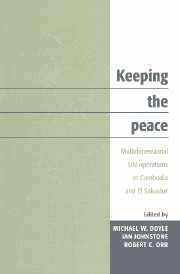Book contents
- Frontmatter
- Contents
- Preface
- Notes on the contributors
- List of abbreviations
- 1 Introduction
- Cambodia
- Map
- 2 Three visions of politics in Cambodia
- 3 The political dynamics of the peacemaking process in Cambodia
- 4 The Cambodian Settlement Agreements
- 5 Holding a fragile peace: the military and civilian components of UNTAC
- 6 Authority and elections in Cambodia
- 7 Returning home: the repatriation of Cambodian refugees
- 8 Quick impacts, slow rehabilitation in Cambodia
- El Salvador
- Conclusion and chronologies
- Select bibliography
- Index
6 - Authority and elections in Cambodia
Published online by Cambridge University Press: 22 October 2009
- Frontmatter
- Contents
- Preface
- Notes on the contributors
- List of abbreviations
- 1 Introduction
- Cambodia
- Map
- 2 Three visions of politics in Cambodia
- 3 The political dynamics of the peacemaking process in Cambodia
- 4 The Cambodian Settlement Agreements
- 5 Holding a fragile peace: the military and civilian components of UNTAC
- 6 Authority and elections in Cambodia
- 7 Returning home: the repatriation of Cambodian refugees
- 8 Quick impacts, slow rehabilitation in Cambodia
- El Salvador
- Conclusion and chronologies
- Select bibliography
- Index
Summary
Introduction
Between May 23 and May 28, 1993, the citizens of Cambodia, who had lived through more than twenty years of civil war, massacre and invasion, voted in a long-awaited election run by the United Nations. The election was the culmination of years of peace talks as well as fifteen months of peacekeeping by the United Nations Transitional Authority in Cambodia (UNTAC).
The news from Cambodia over the preceding months seemed uniformly bleak – massacres of ethnic Vietnamese, attacks on UN soldiers and civilians, harassment of opposition political parties, and incidents of renewed fighting. Journalists, following leaks from critics within UNTAC, had been drawn to the setbacks; and many had written off UNTAC as a failure. Once the election was successfully completed, an opposite pattern was set in the reporting. All the problems that plagued the conduct of the eighteen-month operation were swept aside by the glow of a successful week of elections.
UNTAC assumed an unprecedented degree of “transitional authority” over Cambodia. Not since the colonial era and the post World War II allied occupations of Germany and Japan had a foreign presence held so much formal administrative jurisdiction over the civilian functions of an independent country. In Cambodia, unlike what the UN would next be expected to achieve in Somalia, this authority was exercised with the formal consent of the four parties to Cambodia's long civil strife, a consent negotiated in painstaking detail and embodied in the Paris Agreement of 1991.
- Type
- Chapter
- Information
- Keeping the PeaceMultidimensional UN Operations in Cambodia and El Salvador, pp. 134 - 164Publisher: Cambridge University PressPrint publication year: 1997
- 5
- Cited by



